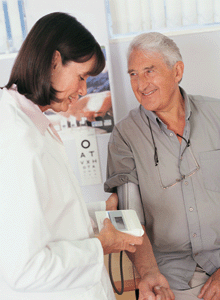Research Matters
November 24, 2008 Blood Protein Helps Assess Cardiovascular RisksThree new studies provide the strongest evidence to date that a simple blood test for a molecule called C-reactive protein (CRP) could help clinicians better identify and treat people who are at risk for cardiovascular disease.  CRP is one of the most widely studied markers of inflammation in cardiovascular disease. But its value as an independent cardiovascular risk factor that could be used to improve treatment decisions—separate from established risk factors such as age, blood cholesterol, blood pressure, diabetes and smoking—has been a topic of debate. Two studies supported by NIH’s National Heart, Lung and Blood Institute (NHLBI) now show that adding CRP measurements to risk-prediction equations increases the accuracy of traditional risk scores. The first study, published online on November 9, 2008, in Circulation: Cardiovascular Quality and Outcomes, was based on medical data from 3,006 participants in NHLBI’s Framingham Heart Offspring Study. The second study, published online on the same date in Circulation, used data from 10,724 men to develop a risk assessment tool for men by adding CRP levels and parental history of early heart disease to traditional risk factors. A comparable assessment tool for women had already been developed last year with NHLBI support. The studies found that adding high-sensitivity CRP levels to risk assessments of a first stroke or heart attack in middle-aged or older adults improves accuracy over traditional assessments by 5-14%. CRP levels proved especially valuable in helping to reclassify heart disease and stroke risk among people considered by traditional methods to be at intermediate risk—that is, with a 10-20% risk of having a heart attack within 10 years. In the third study, which appeared in the New England Journal of Medicine on November 20, 2008, an international randomized clinical trial tested the effectiveness of giving cholesterol-lowering drugs called statins to people who are apparently healthy and have normal or low levels of low-density lipoproteins (LDL), or “bad” cholesterol, but high levels of CRP. Funded by the pharmaceutical company AstraZeneca, the researchers found that a daily dose of a commonly used statin reduced the risk of heart attack, stroke and death by nearly half. The treatment also reduced LDL cholesterol by 50% and CRP by 37%. The trial was halted early, after an average follow-up of about 2 years, because the benefits of statins appeared to be so significant for this population. The latter study suggests that statins might be beneficial even to seemingly healthy people who have low or normal cholesterol levels if they have high CRP. However, the drugs do have some troublesome side effects, including a small increased risk of diabetes and potential liver damage, muscle pain and gastrointestinal problems. And because the trial was stopped early, it’s difficult to assess the drug’s long-term effects when used to treat high CRP. In September 2008, NHLBI established several expert panels to review these and other recent studies regarding the assessment and management of cardiovascular risk factors. After a review of the medical literature, the panels will update evidence-based clinical guidelines to help doctors advise and treat their patients to reduce their risk for cardiovascular disease. “In the meantime, however, we must not lose sight of the essential truth of what we already know to prevent heart disease: Cholesterol still counts, and we have proven ways to lower it and lessen its impact,” says NHLBI Director Dr. Elizabeth G. Nabel. “The value of following a heart-healthy eating plan, being physically active, maintaining a healthy weight and not smoking cannot be overestimated.” Related Links:
Blood Protein Helps Assess Cardiovascular Risks This page was last updated
November 24, 2008
.
|



